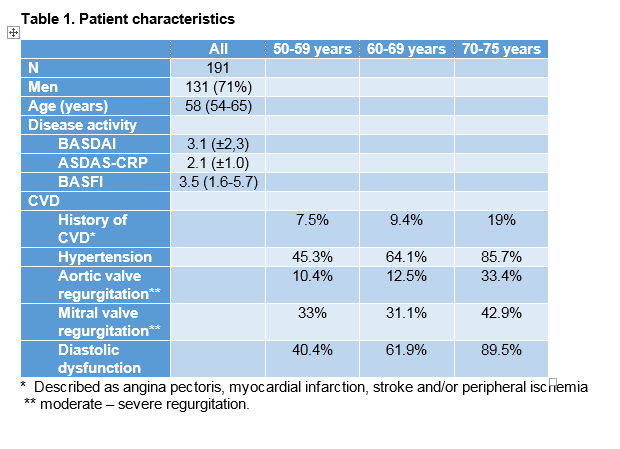Session Information
Session Type: Poster Session (Sunday)
Session Time: 9:00AM-11:00AM
Background/Purpose: The overall mortality rate in ankylosing spondylitis (AS) patients is increased by 60–90% compared with the general population. This higher mortality rate is predominately caused by cardiovascular disease (CVD) comprising both by increased prevalence of cardiac diseases such as valvular heart disease, conduction disturbances and cardiomyopathies as well as atherosclerotic diseases such as myocardial infarctions. However, there is some diversity in the literature and there is a lack of contemporary studies. Therefore, we investigated current prevalences of cardiac disorders in a well characterized cohorts of Dutch patients with AS.
The CARDAS study aims to describe the prevalence of CVD in AS patients in a Dutch cohort.
Methods: We performed a cross-sectional study in consecutive AS patients between 50-75 years. Subjects were recruited from a large rheumatology outpatient clinic (Reade) in Amsterdam, the Netherlands. Patients underwent echocardiography with 2D, spectral and Color Doppler imaging. Diastolic dysfunction was evaluated by an experienced cardiologist based on the AEA/ASE guideline 2009. Furthermore, an ECG, blood sample, surveys and physical examination were performed. Disease activity and function were measured with the BASFI, BASDAI and the ASDAS-CRP.
Results: 191 Consecutive AS patients were included with a median age of 58 years (54-65) of which mostly men (136/191, 71%) (Table 1). The mean disease duration was 34.9 years (± 11.9) The disease activity measures , BASDAI, ASDAS-CRP and BASFI, indicated moderate disease activity and were, respectively 3.1 (±2,3), 2.1 (±1.0) and 3.5 (1.6-5.7). The use of bDMARD’s (anti-TNF) was present in 42% of the AS patients. As cardiac manifestations are age related, AS patients were divided in 3 age categories, respectively, 50-59 years, 60-69 years and 70-75 years. Hypertension was diagnosed in respectively 45.3%, 64.1% and 85.7%. History of CVD described as angina pectoris, myocardial infarction, stroke and/or peripheral ischemia were present in respectively 7.5%, 9.4% and 19%. Diastolic dysfunction was present in respectively 40.4%, 61.9% and 89.5% of the AS patients. The diastolic dysfunction present in this population was mainly mild with 60.2% of patients presenting with grade 1 and 39.8% with grade 2 diastolic dysfunction. Moderate to severe aortic regurgitation was present in, respectively 10.4%, 12.5% and 33.4% and moderate to severe mitral valve regurgitation in 33%, 31.3% and 42.9% of the AS patients. These prevalences are substantially increased in comparison to the general Dutch population.
Conclusion: We demonstrated increased prevalences of diastolic dysfunction, aortic valve regurgitation, mitral valve regurgitation and hypertension in Dutch AS patients compared to age matched general population. Although our results suggest mandatory echocardiography screening, this first needs to be established in prospective follow-up studies.
To cite this abstract in AMA style:
Baniaamam M, Heslinga S, Konings T, Kamp O, van Halm V, van der Horst-Bruinsma I, Nurmohamed M. Increased Prevalence of Cardiac Disorders in Dutch Ankylosing Spondylitis Patients: The CARDAS Study [abstract]. Arthritis Rheumatol. 2019; 71 (suppl 10). https://acrabstracts.org/abstract/increased-prevalence-of-cardiac-disorders-in-dutch-ankylosing-spondylitis-patients-the-cardas-study/. Accessed .« Back to 2019 ACR/ARP Annual Meeting
ACR Meeting Abstracts - https://acrabstracts.org/abstract/increased-prevalence-of-cardiac-disorders-in-dutch-ankylosing-spondylitis-patients-the-cardas-study/

